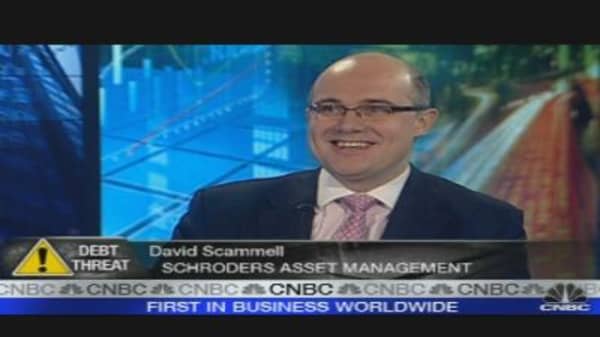Let’s play a game. I’ll remove a few words from the following piece of debt market research and you guess which country the strategist author is talking about.
“The country urgently needs a credible and enforceable austerity plan — the worry for **** investors is that, despite all the **** posturing, politicians still fail to grasp the magnitude of the problem. Repercussions could be severe — the bond vigilantes are hovering and the backdrop is ever threatening …”
Greece? Spain? Portugal?
Actually, it is the UK that Schroders’ Head of European & UK Interest Rate Strategies David Scammell is talking about. But, quite frankly, he could have been talking about any number of countries both in the European Union and beyond. And that is the problem.
We have become used to this kind of concern at the so-called ‘peripheral’ euro zone members. But maybe we need to get real, even if the politicians won’t, and realize that the pain has only just started in a host of Western countries.
Scammell was on "Squawk Box Europe" Tuesday reminding viewers that the rise in Greek yields recently is a clear warning that markets are in the mood to "punish any country that takes creditors for granted."
According to Schroders research, the UK policymakers need to be careful in how much attention they pay to bond investor concerns elsewhere. The UK needs to raise around £220 billion ($343 billion) this year and over £550 billion over the next three years, adding that “the task of the Debt Management Office is daunting.”
And without quantitative easing from the Bank of England, Scammell said the problem would have already come home to roost in 2009. Non-bank private sector investors were net sellers of around £35 billion to £40 billion last year. This was matched by buying from banks and overseas investors of a similar amount. In fact, without QE purchases in the region of £200 billion the Treasury would have had potentially an enormous 2009 funding hole.
As if the problem were not already severe enough, Scammell said the UK dilemma would worsen if the country were to suffer a downgrade from the ratings agencies. UK AAA status is now a topic of open discussion. Implications of a downgrade would include the prospect of much higher funding costs and would be bad news for gilt investors, the economy, banks and the government.
Viewers of "Squawk Box" once again voiced strong opinions Tuesday on the subject of sovereign debt.
Mike agreed that the UK faces serious headwinds:
“I think the UK will be downgraded in the future as our debts are being masked for the moment — the election — we created this global mess along with America and we have massive debt levels now. Greece, Portugal are just the start. You can’t inject massive amounts of liquidity into economies without some kind of repercussions!”
While Jean-Paul in Los Angeles draw parallels with private sector funding:
“There is so much attention on the PIGS and other countries because the private sector has completely deserted and the public sector has been overburdened.”
But Eric fells the differences between the US and Europe needs attention:
“The disconnect between continents isn't adequately appreciated. A guest fretted about the contagion effect of Greek debt concerns, spreading to places like California which is five times the economy of Greece. The US wouldn't let California default under any circumstance just as the EU wouldn't let Greece or any other member state default. While it is currently more complicated for the EU to bail out Greece, laws don't exist until they're written.”
More severe medicine though is called for from Richard:
“The EU should please find a way — quickly, and on an emergency basis — to cut Greece loose from any tie that binds them to the European Union and the euro. Regrettably, there might not be enough room in the fiscal lifeboat at this time and tough choices must be made to cut someone loose. Make no mistake; Greece is definitively the loser. Let 'em go to the IMF."
Greece remains in the eye of the storm but this cyclone has an unpredictable trajectory and we should all wake up to the fact that it is not just the "European periphery" that investors will focus on. As the ERM crisis showed us in the early 1990’s, and the East Asia crisis reminded us again a few years later, the path of international speculation rarely abates before every stone has been upturned.




